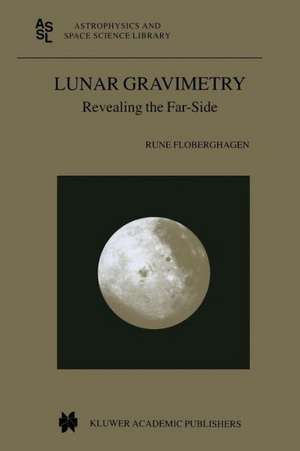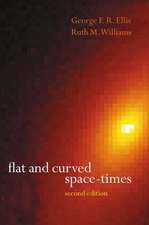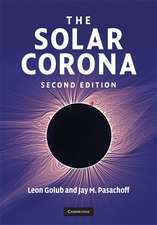Lunar Gravimetry: Revealing the Far-Side: Astrophysics and Space Science Library, cartea 273
Autor Rune Floberghagenen Limba Engleză Paperback – aug 2012
Analysis of the spatial variations of the gravity field of the Moon is a key selenodetic element in the understanding of the physics of the Moon's interior. Remarkably, more than forty years after the initial steps in lunar exploration by spacecraft, the global gravity field still remains largely unknown, due to the limitations of standard observations techniques. As such, knowledge of the high-accuracy and high-resolution gravity field is one of the remaining unsolved issues in lunar science.
Din seria Astrophysics and Space Science Library
- 24%
 Preț: 799.10 lei
Preț: 799.10 lei - 15%
 Preț: 647.92 lei
Preț: 647.92 lei - 18%
 Preț: 983.81 lei
Preț: 983.81 lei - 18%
 Preț: 790.28 lei
Preț: 790.28 lei -
 Preț: 359.86 lei
Preț: 359.86 lei -
 Preț: 389.71 lei
Preț: 389.71 lei - 20%
 Preț: 691.14 lei
Preț: 691.14 lei - 20%
 Preț: 816.18 lei
Preț: 816.18 lei - 18%
 Preț: 1011.27 lei
Preț: 1011.27 lei -
 Preț: 402.56 lei
Preț: 402.56 lei - 15%
 Preț: 664.93 lei
Preț: 664.93 lei -
 Preț: 398.15 lei
Preț: 398.15 lei - 18%
 Preț: 954.77 lei
Preț: 954.77 lei -
 Preț: 411.04 lei
Preț: 411.04 lei - 18%
 Preț: 1225.31 lei
Preț: 1225.31 lei - 18%
 Preț: 1843.29 lei
Preț: 1843.29 lei -
 Preț: 393.13 lei
Preț: 393.13 lei -
 Preț: 400.26 lei
Preț: 400.26 lei - 18%
 Preț: 953.82 lei
Preț: 953.82 lei - 18%
 Preț: 960.61 lei
Preț: 960.61 lei -
 Preț: 398.35 lei
Preț: 398.35 lei -
 Preț: 390.84 lei
Preț: 390.84 lei -
 Preț: 413.76 lei
Preț: 413.76 lei -
 Preț: 416.64 lei
Preț: 416.64 lei - 18%
 Preț: 947.67 lei
Preț: 947.67 lei -
 Preț: 404.51 lei
Preț: 404.51 lei - 18%
 Preț: 956.50 lei
Preț: 956.50 lei -
 Preț: 403.75 lei
Preț: 403.75 lei - 18%
 Preț: 1229.40 lei
Preț: 1229.40 lei - 18%
 Preț: 1224.99 lei
Preț: 1224.99 lei -
 Preț: 404.29 lei
Preț: 404.29 lei - 15%
 Preț: 654.77 lei
Preț: 654.77 lei - 18%
 Preț: 1248.20 lei
Preț: 1248.20 lei - 18%
 Preț: 955.25 lei
Preț: 955.25 lei - 18%
 Preț: 1846.28 lei
Preț: 1846.28 lei - 18%
 Preț: 1233.06 lei
Preț: 1233.06 lei - 18%
 Preț: 1234.77 lei
Preț: 1234.77 lei
Preț: 388.90 lei
Nou
Puncte Express: 583
Preț estimativ în valută:
74.42€ • 80.81$ • 62.52£
74.42€ • 80.81$ • 62.52£
Carte tipărită la comandă
Livrare economică 23 aprilie-07 mai
Preluare comenzi: 021 569.72.76
Specificații
ISBN-13: 9789401571173
ISBN-10: 9401571171
Pagini: 308
Ilustrații: 304 p. 125 illus., 22 illus. in color.
Dimensiuni: 155 x 235 x 16 mm
Greutate: 0.44 kg
Ediția:Softcover reprint of the original 1st ed. 2002
Editura: SPRINGER NETHERLANDS
Colecția Springer
Seria Astrophysics and Space Science Library
Locul publicării:Dordrecht, Netherlands
ISBN-10: 9401571171
Pagini: 308
Ilustrații: 304 p. 125 illus., 22 illus. in color.
Dimensiuni: 155 x 235 x 16 mm
Greutate: 0.44 kg
Ediția:Softcover reprint of the original 1st ed. 2002
Editura: SPRINGER NETHERLANDS
Colecția Springer
Seria Astrophysics and Space Science Library
Locul publicării:Dordrecht, Netherlands
Public țintă
ResearchCuprins
1 Introduction.- 2 Fundamentals of lunar gravity field recovery.- 2.1 Scientific rationale.- 2.2 State-of-the-art of lunar gravity field modelling.- 2.3 Future solutions.- 3 Assessment of modem lunar gravity field models through orbit analysis.- 3.1 Introduction.- 3.2 The role of model calibration.- 3.3 Covariance analysis of GLGM-2 and LP75G.- 3.4 Long-term orbit behaviour.- 3.5 Discussion and outlook based on later Lunar Prospector products.- 4 Ill-conditioning of the lunar gravimetric inverse problem.- 4.1 Setting the stage.- 4.2 The multiple roles of regularisation in lunar gravimetry.- 4.3 Regularisation methods and the view on the estimation process.- 4.4 Information content and effect of the bias on the quality description.- 4.5 Searching for the optimal regularisation parameter.- 5 Lunar gravity field modelling experiments with European data sets.- 5.1 Introduction.- 5.2 The Lunar Prospector tracking campaign at Weilheim.- 5.3 Orbit determination using Weilheim data.- 5.4 Gravity field recovery using Weilheim data.- 6 Towards a global data set.- 6.1 Introduction.- 6.2 SST concepts.- 6.2.1 Low—low configurations — the MORO study.- 6.2.2 High—low configurations — the SELENE experiment.- 6.3 Covariance analysis of low—low selenopotential recovery.- 6.3.1 Time-wise approach in the time-domain — the Colombo method.- 6.3.2 The linear low—low SST observation equation.- 6.3.3 Formal errors based on low—low range rate measurements..- 6.3.4 A note on omission errors.- 6.4 Full-scale simulation of low—low selenopotential estimation.- 6.4.1 The simulation setup.- 6.4.2 Gravity field recovery results.- 7 Epilogue.- 7.1 Conclusions.- 7.2 Recommendations for further research.- A Fundamentals of selenography.- B The generalised singular value decomposition(GSVD).- C Some useful coordinate transformations.- D The Euler-Lagrange equation and the range rate SST signal.- D.1 The Euler-Lagrange formalism.- D.2 Satellite velocity and the conservative forcing function in inertial space.- D.3 The forcing function in body-fixed rotating coordinates.- D.4 The low-low range rate SST signal equation.
Recenzii
"Lunar Gravimetry: Revealing the Far-Side is a long-awaited monograph wrapping up the past decades of lunar gravimetric research. Despite a series of new lunar missions and extensive research on the subject, half of the lunar globe has remained unaccessed. The author illusively shows how this deficit impacts today's knowledge about the Moon, how to attack this problem in modern data analysis and how to ultimately solve it by dedicated inter-satellite tracking in future lunar exploration missions."
(Dr. Oliver Montenbruck, Section Space Flight Dynamics, German Space Operations Center)
(Dr. Oliver Montenbruck, Section Space Flight Dynamics, German Space Operations Center)















